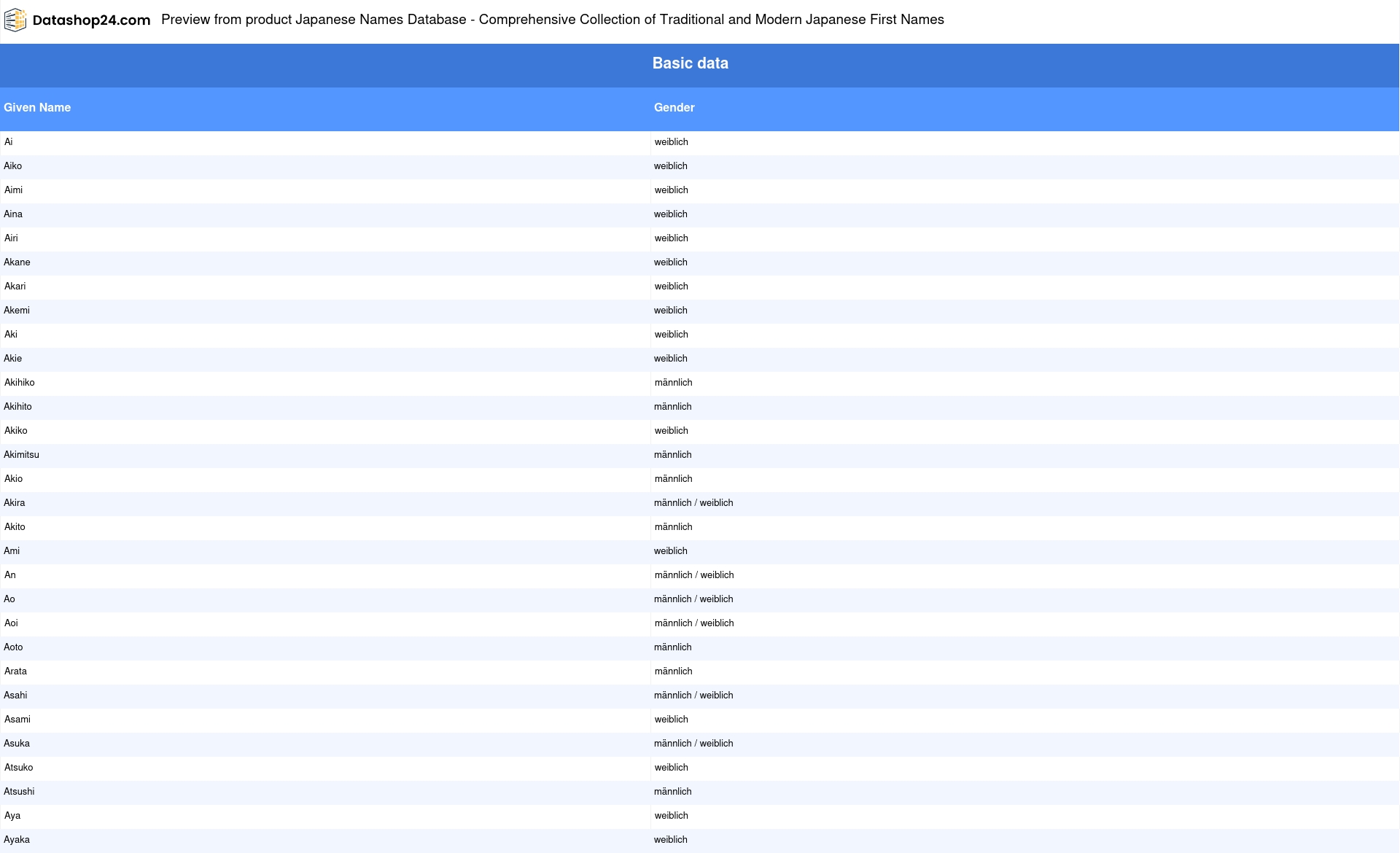Japanese Names Database - Comprehensive Collection of Traditional and Modern Japanese First Names
Japanese Names Database - Essential Details and Key Features






 Up-to-date and carefully verified data
Up-to-date and carefully verified data Company-wide unlimited usage period
Company-wide unlimited usage period No waiting, immediate access after purchase
No waiting, immediate access after purchaseComprehensive Japanese Names Database for Your Projects and Applications
Our extensive Japanese names database provides you with 496 carefully curated Japanese first names, each classified by gender to support your diverse project requirements. This comprehensive collection includes traditional Japanese names alongside contemporary choices, offering both male and female names as well as unisex options. The database is delivered in Excel format, making it easy to filter, sort, and integrate into CRM systems, marketing tools, databases, or any other application requiring Japanese name data.
The database contains two essential fields: the Japanese first name and gender classification (male, female, or unisex). This structured approach enables precise data filtering and targeted usage for your specific needs, whether you're developing applications, conducting research, or personalizing content for Japanese audiences.
For detailed insights into the database structure and content distribution, refer to the following overview:
Basic data
Why Purchase Our Japanese Names Database Instead of Manual Research?
Compiling a comprehensive collection of authentic Japanese names requires extensive research across multiple sources, cultural understanding, and precise gender classification. Our ready-to-use database eliminates this time-intensive process and provides immediate access to professionally curated data.
- Significant time savings: Avoid weeks of manual research across Japanese name dictionaries, cultural references, and linguistic sources
- Cultural accuracy: Names are selected and classified based on authentic Japanese naming conventions and cultural context
- Gender precision: Each name includes accurate gender classification, including unisex options that are common in Japanese culture
- Ready-to-use format: Excel format enables immediate integration into your existing workflows and systems
- Quality assurance: Names are validated through multiple sources to ensure authenticity and proper romanization
- Comprehensive coverage: Includes both traditional names with deep cultural significance and modern Japanese names
- Cost-effective solution: Eliminate research costs and reduce project timelines significantly
Useful Information and Frequently Asked Questions
Do Japanese people have middle names?
Traditional Japanese naming conventions do not include middle names. Japanese people typically have a family name (surname) followed by a given name (first name). However, some Japanese individuals living internationally may adopt middle names for practical purposes, particularly when dealing with Western naming systems that expect multiple given names.
How do Japanese names work?
Japanese names consist of a family name (??, myoji) written first, followed by a given name (??, namae). The family name comes before the personal name, which is the opposite of Western naming conventions. Japanese names are traditionally written in kanji characters, but can also be written in hiragana or katakana. When romanized for international use, the order may be reversed to match Western conventions.
What are Japanese boy names?
Japanese male names often incorporate kanji characters that represent strength, honor, wisdom, or natural elements. Common elements include characters meaning "large" (?), "wisdom" (?), "tree" (?), or "hero" (?). Popular Japanese boy names include Hiroshi, Takeshi, Satoshi, and Akira. Many male names end with common suffixes like -ro (?), -ta (?), or -ki (?).
What are Japanese girl names?
Japanese female names frequently feature kanji characters representing beauty, flowers, colors, or positive qualities. Common elements include characters for "flower" (?), "beautiful" (?), "love" (?), or "child" (?). Popular Japanese girl names include Sakura, Yuki, Akiko, and Emiko. Traditional female names often end with -ko (?), meaning "child," though modern names show more variety in endings.
Fascinating Facts About Japanese Names and Naming Culture
Japanese naming culture reflects deep philosophical and cultural values. Many Japanese names are chosen based on the meaning of their kanji characters, with parents carefully selecting combinations that express their hopes for their child's future. The practice of "name divination" (????, seimei handan) considers the stroke count and balance of characters to determine auspiciousness. Interestingly, the same name can be written with different kanji characters, creating multiple meanings for phonetically identical names. Seasonal influences play a significant role, with names like Sakura (cherry blossom) or Yuki (snow) reflecting Japan's strong connection to nature's cycles. Modern Japanese parents increasingly choose names that work well internationally, leading to a trend toward names that are easily pronounced in multiple languages while maintaining Japanese cultural identity.






 Up-to-date and carefully verified data
Up-to-date and carefully verified data Company-wide unlimited usage period
Company-wide unlimited usage period No waiting, immediate access after purchase
No waiting, immediate access after purchase







